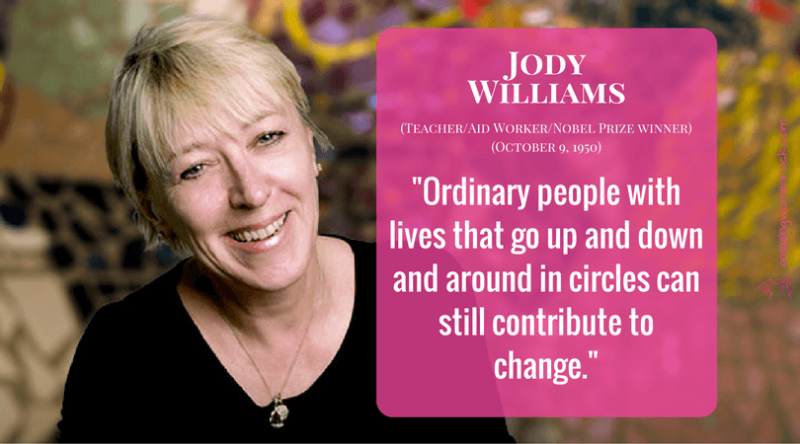Jody Williams (Teacher/Aid Worker/1997 Nobel Peace Prize Winner)
Jody Williams (born October 9, 1950 in Brattleboro, Vermont, USA) is an American teacher and aid worker who received the 1997 Nobel Peace Prize jointly with the campaign she worked for, the International Campaign to Ban Landmines (ICBL).
"For me, the difference between an 'ordinary' and an 'extraordinary' person is not the title that person might have, but what they do to make the world a better place for us all."
Williams first trained as a teacher of English as a Second Language (ESL), receiving a BA from the University of Vermont in 1972 and a Master's degree in teaching Spanish and ESL from the School for International Training (also in Vermont) in 1974.
In 1984 she received a second M.A. in International Relations from the School of Advanced International Studies at Johns Hopkins University.
She taught ESL in Mexico, the United Kingdom, and finally Washington, D.C. before her first appointment in aid work, becoming a grocery worker of the "Nicaragua-Honduras Education Project" from 1984 to 1986.
She then became deputy director of a Los Angeles-based charity, "Medical Aid for El Salvador", a position which she held until 1992 when she took up her position with the newly formed ICBL.
The organization ultimately achieved its goal in 1997 when an international treaty (Ottawa Treaty) banning antipersonnel landmines was signed in Ottawa in 1997 (though some nations, notably the United States, People's Republic of China (PRC), and Russia refrained).
One broader aspect of Williams' work was her pioneering use of People Power: massively distributed collaboration in trans-national political action, initially via fax and eventually via email—Williams' own explanation,
"Imagine trying to get hundreds of organizations – each one independent and working on many, many issues – to feel that each is a critical element of the development of a new movement. I wanted each to feel that what they had to say about campaign planning, thinking, programs, actions was important. So, instead of sending letters, I’d send everyone faxes. People got in the habit of faxing back. This served two purposes – people would really have to think about what they were committing to doing before writing it down, and we have a permanent, written record of almost everything in the development of the campaign from day one."
Williams continues to serve the ICBL as a campaign ambassador and editor of the organization's landmine report, and, since 2003, has held a faculty position of distinguished professor of social work and global justice at the University of Houston Graduate College of Social Work.
In 2006, Williams was one of the founders of The Nobel Women's Initiative along with sister Nobel Peace Laureates Rigoberta Menchu Tum, Shirin Ebadi, Wangari Maathai, Betty Williams and Mairead Corrigan Maguire. Six women representing North America and South America, Europe, the Middle East and Africa decided to bring together their experiences in a united effort for peace with justice and equality. It is the goal of the Nobel Women's Initiative to help strengthen work being done in support of women's rights around the world.
She was the Head of Mission of the High-Level Mission dispatched by the Human Rights Council to report on the situation of human rights in Darfur and the needs of Sudan in this regard (established at the 4th special session of the Human Rights Council in decision S-4/101). The Mission issued its report on 7 March 2007.
